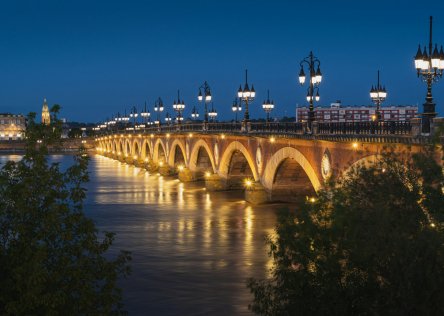Many travellers are nervous about inadvertently offending local people, or committing a ‘faux pas’, while they’re visiting another country. That’s why we only work with local people who we know will offer our travelers a warm welcome and be patient, helpful, and understanding as they learn about and adapt to the culture around them.
The French may appear to be closed, indifferent or inattentive sometimes (particularly in restaurants and stores); but sometimes there’s a good reason for this. Like any nationality, we have characteristics and ‘quirks’ that are very particular to our country’s culture and history.
In our travelers’ guidebooks, and now here on the blog, we share with you some essential things to know about French etiquette and culture before you travel. We want to help you feel more knowledgeable and confident when you arrive in France, and perhaps see French people in a new light!
When in France, try to speak French
Or if you are an absolute beginner, make an effort and always greet people with 'Bonjour Madame/Monsieur' (or Bonsoir if it’s the evening). This includes hotel staff, sales assistants, waiters, and tour guides.
It may be daunting to try to speak another language, and you may feel embarrassed about your pronunciation; but it will help break the ice, and you’ll probably receive a better service in stores and restaurants. People won’t mind if you make mistakes – it’s the gesture that counts.
Politeness is important in France, so if people see you’re trying to speak their language, they will appreciate it. Here are a few essential French phrases to get you started.
When speaking English, speak slowly
If you make the effort to speak French, and the person you’re speaking to speaks some English, they will often be happy to switch to English. But remember that English is not their first language (even if it seems much better than your French).
Put yourself in their shoes and imagine how you’d feel if someone approached you in your country and started speaking in rapid French. Annoyed? Confused? Overwhelmed? That’s how French people may feel if you do the same to them in English.
Speak slowly and use simple language so that they can understand you. This will help the conversation flow and avoid any awkwardness.
Don’t believe the French stereotypes
Parisians have a reputation all over the world for being arrogant and rude, but it’s not just tourists that think this. The people in the rest of France also find Parisians rude. But, again, sometimes it’s a case of putting yourself in the other person’s shoes.
Paris is a big and bustling city, with millions of people moving around at the same time. It’s quite understandable that a Parisian – like a New Yorker - would become impatient with a tourist who walks slowly in front of them while looking at the map on their phone.
City life can also be stressful, so if someone seems a little off with you, it’s always possible that they’re just having a bad day!
‘Non!’ rarely means “No”
The French are known for being frank, and you may find that the answer to what seems like a reasonable request to you is met with a brusque ‘Non!’. But rather than be offended or irritated, we suggest you see it as a challenge, and embrace it!
Reading between the lines, ‘Non!’ can actually mean ‘I might consider your request if you can convince me there’s a good reason for it.’
For example, if you’re feeling cold in a restaurant and would prefer to move to a table away from the door or air-con, call the waiter over with a cheerful ‘Excusez-moi, Monsieur!’ and make some theatrical gestures to show him you’re cold. You may find he is more willing to oblige.
The etiquette of waiting in line
If you’re ever waiting in line at the bus-stop, station, store, market or anywhere else where you’d normally expect to wait your turn, you’ll notice that the French are quite relaxed about this.
At a bus-stop or on the metro in Paris, it’s common for people to push to the front of the line and try to get on first. However, once everyone’s on, people will normally start offering seats to those who need them.

Paris Metro/Subway (Photo: Pixabay)
Take your time
The pace of life in Paris is fast, but in the rest of the country, life is more relaxed. French people are generally on time but tend to be less concerned about punctuality in the south of France.
But regardless of punctuality, the French believe that anything worth doing should be done well – and this means taking your time, and giving others space to take theirs too.
In practice, this means waiters will give you plenty of time to peruse the menu before taking your order (you must close your menu to signal to the waiter that you’re ready to order). They also won’t bring you the check as soon as you’ve finished your coffee – the idea is to relax and take your time to enjoy the whole dining experience.
Customer service in France
Similar to above, if you’re shopping in France, the sales assistants will normally leave you to browse on your own. If you need anything, you will need to approach them.
This might seem like poor customer service, but they see it as giving you time and space to find something you like, without making you feel pressured. They prefer not to bother you unless you need their help; and when you do, be sure to open with Bonjour! and finish with Merci!
Tipping in France
You’ll see that in French restaurants, the service charge is always included. But if you’re really happy with the service you received, your waiter will really appreciate it if you leave some extra change. Waiters work hard and receive the minimum wage, so tips really help. The amount you leave is less important than the gesture.
It’s not necessary to tip cab drivers in France, but if you have a nice driver and a pleasant journey, you may add an extra euro or two to the fare at the end.
Tipping tour guides in France is expected. If you have been on a group tour, tip between 5€ and 20€, depending on how long the tour was, and how much you enjoyed it.
In France, we don’t ask for coffee “to go”
Unless you go to a Starbucks in one of the big cities, you wouldn’t normally ask for a coffee ‘to go’ in France.
Remember: French people take their time – and you’re on vacation! In our view, to really enjoy a cup of coffee means taking a seat and relaxing.
There are so many lovely coffee shops in France, we suggest finding one with an outside terrace (if the weather’s good) and watching the world go by as you sip your coffee and enjoy a crispy croissant.

Slow down and enjoy your coffee on one of France's many café terraces (Photo: pxhere)
Don't try to change the menu (and no ‘doggy bags’!)
When you’re ordering food in a restaurant, in many countries it is quite normal to ask for your dishes to be served in a specific way.
You might prefer to have red pepper instead of tomato in your salad, or you might prefer no cucumber, and since you’re not having cucumber, can you have some extra lettuce instead?
These kinds of requests are not the ‘done thing’ in France, unless you’re allergic to one of the ingredients. Try to enjoy what’s on offer, and if there’s something you don’t like, you can always leave it on the plate.
We also don’t ask for doggy bags or takeout boxes for leftovers at the end of a meal. This is because in France we value quality over quantity, and therefore the portions are small enough that you should be able to finish your meal.
If you see the waiters offering a take-out box to other diners then you may ask too; otherwise try to enjoy as much of your meal as you can in the restaurant.
The French value privacy (and a ‘comfortable silence')
The French are very open people but we won’t necessarily feel comfortable revealing our character to people we don’t know well. We therefore adapt how we behave based on the situation.
We’re normally very relaxed among close friends and family, but we may appear formal and distant (yet polite) to people we don’t know.
One thing that foreigners sometimes find hard to deal with is that in France, we prefer a ‘comfortable silence’ over chitchat.
Topics of conversation to avoid
When you’re with people you’ve just met or don’t know well, stick to talking about safe topics such as current affairs, food, sports, and the arts.
Topics to avoid include asking someone about their personal life (are you married?), their careers, money matters or even what they did last weekend. Most French people will find these topics far too personal for a first or second encounter.
We enjoy expressing our opinions
In France, dinner time can be a grand affair with family and friends. It’s a time to catch up, savor good food and wine, and of course, enjoy a heated debate! This is, in fact, a centuries-old tradition and an important part of our culture.
In the 17th century, French philosopher René Descartes stated that to get to the truth of a matter it was crucial to examine both sides of an argument. This idea was hugely influential, and as a result, the French enjoy playing the ‘devil’s advocate’.
Sometimes people will even argue points that they don’t agree with, to make a discussion more interesting! This might be annoying, but try to understand – we’re just having a good time and enjoying a healthy debate!

For the French, it's very important to discuss all sides of an argument - even if you disagree (Lamiot, CC-BY-SA 4.0)
We’re comfortable dressing down
Although French people are known for their chic fashion sense, in everyday situations we are more likely to choose to dress casually.
We still dress up for formal occasions, such as a night at the opera or a dinner at a posh restaurant, so it’s a good idea to bring at least one nice outfit if you plan on going someplace nice on your trip to France.
You will also need to be ready to cover your shoulders and legs if you’re entering a church or another place of worship. Otherwise, jeans, t-shirt and sneakers will normally be fine.
What to do when you get invited to dinner
If you’ll be attending a hosted dinner in France, here are a few things to keep in mind. Don’t plan to arrive early – it won’t be ideal if you arrive while your host is still preparing dinner. Either be punctual or arrive up to 15 minutes late.
Although in many countries it is customary to arrive with a bottle of wine, we don’t recommend this. Your host will have chosen wine that goes perfectly with the meal they have prepared. Instead, a bottle of wine can be a nice ‘goodbye’ or ‘thank you’ present to give to hosts when you’re leaving at the end of a stay.
At the dinner table, wait for the host to say ‘Bon appétit! before starting your meal. There is likely to be more than enough wine on the table, so once you’ve had enough, leave your glass full or your host will keep topping it up (for an empty wine glass is a sad sight indeed!).
To kiss or not to kiss?
When greeting people, thanking people or saying goodbye in France, it’s common to ‘faire la bise’.
This custom can be a source of worry for foreigners: Am I supposed to touch their cheek with my lips, or just ‘air kiss’? How many kisses should I give? What do I do with my hands?! The funny thing is, at a gathering, you might kiss twenty people without ever finding out anyone’s name!
If you’re not sure what to do, just watch what everyone else does, and follow the other person’s lead. Normally in France we give two kisses - one on each cheek. Whether or not the lips touch the skin is up to you – it’s the gesture that matters.
If all of this is a bit overwhelming, don’t worry. Just follow our lead, and remember that a friendly ‘Bonjour Madame/Monsieur’ and ‘Merci beaucoup’ can go a long way in France!












